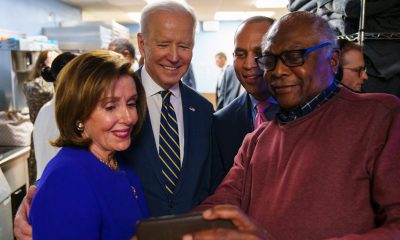Business
Retailers Fret as Products Languish on Ships, Docks at Ports

Container ships wait at the dock to be unloaded at the Port of Oakland Thursday, Feb. 12, 2015, in Oakland, Calif. Companies that operate marine terminals didn’t call workers to unload ships Thursday that carry car parts, furniture, clothing, electronics, just about anything made in Asia and destined for U.S. consumers. (AP Photo/Ben Margot)
JUSTIN PRITCHARD, Associated Press
LOS ANGELES (AP) — It’s early for many Americans still sloshing through winter to plan their gardens, home improvements and spring sports leagues, but stores gearing up for warmer weather are fretting that they won’t have some products to sell due to a labor crisis at West Coast seaports.
The critical gateways for international trade have become more like parking lots for massive cargo ships that haul a you-name-it selection of consumer goods made in Asia and return there with U.S. exports.
The result: Containers of shovels, fencing, bathroom tiles, shoes, even parts to make summer camp footlockers are stuck at the docks or on ships anchored just offshore.
So are car parts, medical equipment and furniture. And U.S.-produced perishables, including meat and produce, are unable to be sent to Asian consumers.
“Someday the snow will melt back East. There’s a huge market for those home-improvement and garden articles,” said Mark Hirzel, president of the Los Angeles Customs Brokers and Freight Forwarders Association, whose members help companies get imports to distribution warehouses and send exports overseas.
For now, many of those products are stuck.
Dockworkers and their employers have been negotiating a new contract since May, but in recent weeks talks have stalled, all but paralyzing 29 ports that handle about one-quarter of U.S. international trade. That’s around $1 trillion worth of cargo annually.
In the latest twist, companies that run marine terminals locked out the majority of dockworkers Thursday. Employers didn’t call crews to operate the towering cranes that hoist cargo on and off ships.
The partial lockout also is planned for Saturday, Sunday and Monday. Each is either a holiday or weekend for which employers would have to pay dockworkers extra — and with contract dispute, that is not going to happen.
Friday is a normal workday and employers plan to hire full crews.
Employers say dockworkers have intentionally slowed their work for months and won’t be rewarded with higher wages. The dockworkers’ union denies slowing work.
Talks have stalled over how to arbitrate future workplace disputes. Some of the biggest issues, including health care, have been resolved with tentative agreements.
Pay remains an issue in the negotiations. The Pacific Maritime Association, which represents terminal operators and shipping lines, says the average full-time longshoreman makes $147,000 annually.
The International Longshore and Warehouse Union vigorously disputes that figure. Spokesman Craig Merrilees said wages typically range from $26 to $36 an hour and noted that many longshoremen are not full-time employees.
As the two sides quarrel, a backup of ships that extends into the Pacific will only grow. On Thursday, 14 ships laden with containers of goods were anchored outside the ports of Los Angeles and Long Beach; another 11 were awaiting berths outside the ports of Oakland or Seattle and Tacoma in Washington.
Among the importers with goods on the water is AICO Furniture, whose manufacturers are in Asia. In total, 70 containers are either stuck or on their way with no obvious way to get unloaded, said Martin Ploy, the company’s president.
“When Mrs. Jones calls the furniture store and says, ‘I’ve been waiting for months now. When am I going to get this?’ they don’t have a good answer,” Ploy said. “It challenges everybody’s credibility. The consumer gets angry with the retailer, the retailer gets angry with us. And of course, we’re angry with this whole situation here.”
At a Capitol Hill news conference, lawmakers discussed other impacts of the backlog. Rep. Bob Gibbs, R-Ohio, said a major supplier of medical equipment in his state told him it is rationing protective clothing for health care workers because of trouble getting imports.
Exporters also are suffering, notably producers of products such as hay and potatoes, as well as pork and beef.
“There’s nothing we produce in agriculture or forest products that can’t be sourced somewhere else in the world,” said Peter Friedmann, executive director of the Agriculture Transportation Coalition. “You can get it somewhere else in the world, and they are.”
Cargo began moving slowly across the troubled West Coast waterfront months ago. Containers that used to take two or three days to hit the highway have been taking a week or more.
Some importers have reacted by diverting shipments to ports on the East and Gulf coasts. Others have turned to air cargo, paying a premium that can be five or more times more than the cost of sea-borne shipments.
In recent days, the union said companies are exaggerating the extent of congestion so they can cut dockworker shifts and pressure negotiators into a contract agreement.
Negotiations resumed Thursday in San Francisco — the first day the two sides have met since Feb. 6 — amid increasing pressure from elected officials and businesses to reach a deal.
___
AP writers Kevin Freking in Washington, and Raquel Maria Dillon in Los Angeles contributed to this report.
___
Contact Justin Pritchard at http://twitter.com/lalanewsman.
Copyright 2015 The Associated Press. All rights reserved. This material may not be published, broadcast, rewritten or redistributed.
Bay Area
State Controller Malia Cohen Keynote Speaker at S.F. Wealth Conference
California State Controller Malia Cohen delivered the keynote speech to over 50 business women at the Black Wealth Brunch held on March 28 at the War Memorial and Performing Arts Center at 301 Van Ness Ave. in San Francisco. The Enterprising Women Networking SF Chapter of the American Business Women’s Association (ABWA) hosted the Green Room event to launch its platform designed to close the racial wealth gap in Black and Brown communities.

By Carla Thomas
California State Controller Malia Cohen delivered the keynote speech to over 50 business women at the Black Wealth Brunch held on March 28 at the War Memorial and Performing Arts Center at 301 Van Ness Ave. in San Francisco.
The Enterprising Women Networking SF Chapter of the American Business Women’s Association (ABWA) hosted the Green Room event to launch its platform designed to close the racial wealth gap in Black and Brown communities.
“Our goal is to educate Black and Brown families in the masses about financial wellness, wealth building, and how to protect and preserve wealth,” said ABWA San Francisco Chapter President LaRonda Smith.
ABWA’s mission is to bring together businesswomen of diverse occupations and provide opportunities for them to help themselves and others grow personally and professionally through leadership, education, networking support, and national recognition.
“This day is about recognizing influential women, hearing from an accomplished woman as our keynote speaker and allowing women to come together as powerful people,” said ABWA SF Chapter Vice President Velma Landers.
More than 60 attendees dined on the culinary delights of Chef Sharon Lee of The Spot catering, which included a full soul food brunch of skewered shrimp, chicken, blackened salmon, and mac and cheese.
Cohen discussed the many economic disparities women and people of color face. From pay equity to financial literacy, Cohen shared not only statistics, but was excited about a new solution in motion which entailed partnering with Californians for Financial Education.
“I want everyone to reach their full potential,” she said. “Just a few weeks ago in Sacramento, I partnered with an organization, Californians for Financial Education.
“We gathered 990 signatures and submitted it to the [California] Secretary of State to get an initiative on the ballot that guarantees personal finance courses for every public school kid in the state of California.
“Every California student deserves an equal opportunity to learn about filing taxes, interest rates, budgets, and understanding the impact of credit scores. The way we begin to do that is to teach it,” Cohen said.
By equipping students with information, Cohen hopes to close the financial wealth gap, and give everyone an opportunity to reach their full financial potential. “They have to first be equipped with the information and education is the key. Then all we need are opportunities to step into spaces and places of power.”
Cohen went on to share that in her own upbringing, she was not guided on financial principles that could jump start her finances. “Communities of color don’t have the same information and I don’t know about you, but I did not grow up listening to my parents discussing their assets, their investments, and diversifying their portfolio. This is the kind of nomenclature and language we are trying to introduce to our future generations so we can pivot from a life of poverty so we can pivot away and never return to poverty.”
Cohen urged audience members to pass the initiative on the November 2024 ballot.
“When we come together as women, uplift women, and support women, we all win. By networking and learning together, we can continue to build generational wealth,” said Landers. “Passing a powerful initiative will ensure the next generation of California students will be empowered to make more informed financial decisions, decisions that will last them a lifetime.”
Business
Black Business Summit Focuses on Equity, Access and Data
The California African American Chamber of Commerce hosted its second annual “State of the California African American Economy Summit,” with the aim of bolstering Black economic influence through education and fellowship. Held Jan. 24 to Jan. 25 at the Westin Los Angeles Airport Hotel, the convention brought together some of the most influential Black business leaders, policy makers and economic thinkers in the state. The discussions focused on a wide range of economic topics pertinent to California’s African American business community, including policy, government contracts, and equity, and more.

By Solomon O. Smith, California Black Media
The California African American Chamber of Commerce hosted its second annual “State of the California African American Economy Summit,” with the aim of bolstering Black economic influence through education and fellowship.
Held Jan. 24 to Jan. 25 at the Westin Los Angeles Airport Hotel, the convention brought together some of the most influential Black business leaders, policy makers and economic thinkers in the state. The discussions focused on a wide range of economic topics pertinent to California’s African American business community, including policy, government contracts, and equity, and more.
Toks Omishakin, Secretary of the California State Transportation Agency (CALSTA) was a guest at the event. He told attendees about his department’s efforts to increase access for Black business owners.
“One thing I’m taking away from this for sure is we’re going to have to do a better job of connecting through your chambers of all these opportunities of billions of dollars that are coming down the pike. I’m honestly disappointed that people don’t know, so we’ll do better,” said Omishakin.
Lueathel Seawood, the president of the African American Chamber of Commerce of San Joaquin County, expressed frustration with obtaining federal contracts for small businesses, and completing the process. She observed that once a small business was certified as DBE, a Disadvantaged Business Enterprises, there was little help getting to the next step.
Omishakin admitted there is more work to be done to help them complete the process and include them in upcoming projects. However, the high-speed rail system expansion by the California High-Speed Rail Authority has set a goal of 30% participation from small businesses — only 10 percent is set aside for DBE.
The importance of Diversity, Equity and Inclusion (DEI) in economics was reinforced during the “State of the California Economy” talk led by author and economist Julianne Malveaux, and Anthony Asadullah Samad, Executive Director of the Mervyn Dymally African American Political and Economic Institute (MDAAPEI) at California State University, Dominguez Hills.
Assaults on DEI disproportionately affect women of color and Black women, according to Malveaux. When asked what role the loss of DEI might serve in economics, she suggested a more sinister purpose.
“The genesis of all this is anti-blackness. So, your question about how this fits into the economy is economic exclusion, that essentially has been promoted as public policy,” said Malveaux.
The most anticipated speaker at the event was Janice Bryant Howroyd known affectionately to her peers as “JBH.” She is one of the first Black women to run and own a multi-billion-dollar company. Her company ActOne Group, is one of the largest, and most recognized, hiring, staffing and human resources firms in the world. She is the author of “Acting Up” and has a profile on Forbes.
Chairman of the board of directors of the California African American Chamber of Commerce, Timothy Alan Simon, a lawyer and the first Black Appointments Secretary in the Office of the Governor of California, moderated. They discussed the state of Black entrepreneurship in the country and Howroyd gave advice to other business owners.
“We look to inspire and educate,” said Howroyd. “Inspiration is great but when I’ve got people’s attention, I want to teach them something.”
Activism
Oakland Post: Week of April 17 – 23, 2024
The printed Weekly Edition of the Oakland Post: Week of April 17 – 23, 2024

To enlarge your view of this issue, use the slider, magnifying glass icon or full page icon in the lower right corner of the browser window. ![]()
-

 Activism4 weeks ago
Activism4 weeks agoOakland Post: Week of March 27 – April 2, 2024
-

 #NNPA BlackPress4 weeks ago
#NNPA BlackPress4 weeks agoCOMMENTARY: D.C. Crime Bill Fails to Address Root Causes of Violence and Incarceration
-

 #NNPA BlackPress4 weeks ago
#NNPA BlackPress4 weeks agoFrom Raids to Revelations: The Dark Turn in Sean ‘Diddy’ Combs’ Saga
-

 #NNPA BlackPress4 weeks ago
#NNPA BlackPress4 weeks agoCOMMENTARY: Lady Day and The Lights!
-

 #NNPA BlackPress4 weeks ago
#NNPA BlackPress4 weeks agoMayor, City Council President React to May 31 Closing of Birmingham-Southern College
-

 #NNPA BlackPress4 weeks ago
#NNPA BlackPress4 weeks agoBaltimore Key Bridge Catastrophe: A City’s Heartbreak and a Nation’s Alarm
-

 #NNPA BlackPress4 weeks ago
#NNPA BlackPress4 weeks agoBaltimore’s Key Bridge Struck by Ship, Collapses into Water
-

 #NNPA BlackPress4 weeks ago
#NNPA BlackPress4 weeks agoBeloved Actor and Activist Louis Cameron Gossett Jr. Dies at 87





















































